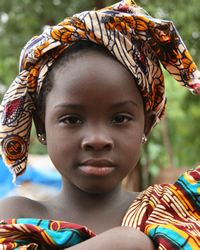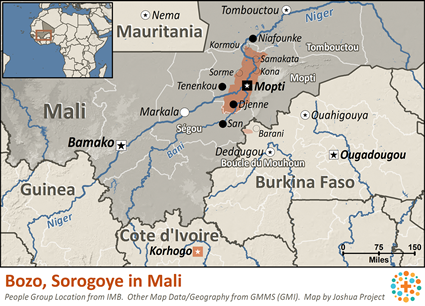Bozo comes from the Bambara term for straw house; it's a reference to dwellings in temporary fishing camps. People use this term for an entire ethnic group. "Bozo" is really three distinct people groups speaking four varieties of the so called Bozo language. One of these is Jenaama, the language of the Jenaama Bozo people. This Bozo subgroup lives mainly in Mali, but they are also in Cote d Ivoire and Nigeria.
The major historical facts concerning the Bozo people that might affect their receptivity to the Christian message are as follows. The people group has been Muslims for about two to three generations and does not have a history of being Christian. They are a smaller people group with neighboring groups that have Christian churches, thus giving the impression that Christianity is okay for the Dogon or Bobo people groups who were not highly Muslim.
France colonized the country and has made a certain impression on the people groups as to what Christians are (i.e. like French). The Bozo are limited in their education as few people go to school. Also, few people understand French which makes them less accessible.
The Bozo people highly value community. This is true whether they are village elders or women at a communal water well. Many of them are fishermen and there are fishing camps made up of straw huts on the Niger River islands. The Bozo also work in rice fields.
The women are often maintaining their fires, pounding millet for porridge, scrubbing blackened pots and re-muddling the outsides for cooking again. They can also be seen carding and spinning cotton or other chores. It is also their job to prepare the fish for selling and sell it in the market.
Things, however, are changing for the Bozo as their lives are becoming more modernized. Technology is leveling the tropics - cell phones, video, CD players, television and satellites are making a huge impact on society. Money and goods are becoming an important commodity. There is increased accessibility by boat or road, making travel easier and more possible. There is becoming an increase in knowledge and education within the tribe as some are going to school in other villages. Overall, there is very little education within the people group. In general, this people group is becoming more aware of the world outside them.
Most of them are Muslim, but they blend Islam with traditional spirit worship. Both national and expatriate missionaries are doing evangelism.
There are various factors to consider when determining how to initially reach out to them. Tribes are vanishing faster than mission organizations are succeeding in translating Scripture into their languages. In general, tribal groups are refugees, living in perpetual fear of aggression from other tribes or powerful civilizations. Often, they are able to survive by finding out how to live where no one else would want the land. This is important to realize that the Bozos are a nomadic people and are thus on the move. It is important to be willing to travel along with them. Also, this tribal group is animistic; beneath the Muslim surface, there is a strong animistic undercurrent. They already have their own distinctive religious systems and worldviews. It will be thus important to slowly enter society and gradually become accepted. This people group will likely not respond to being directly evangelized.
Pray that mission organizations and churches will accept the challenge of adopting and reaching the Jenaama Bozo of Mali.
Ask the Lord to send loving Christians from other parts of Africa to the Jenaama Bozos.
Pray for Jenaama Bozo leaders to have their hearts opened through dreams and visions.
Ask the Lord to raise up strong local churches that will plant more churches among the Bozo people.
Scripture Prayers for the Bozo, Jenaama in Mali.
Christy Edwards
| Profile Source: Joshua Project |

























